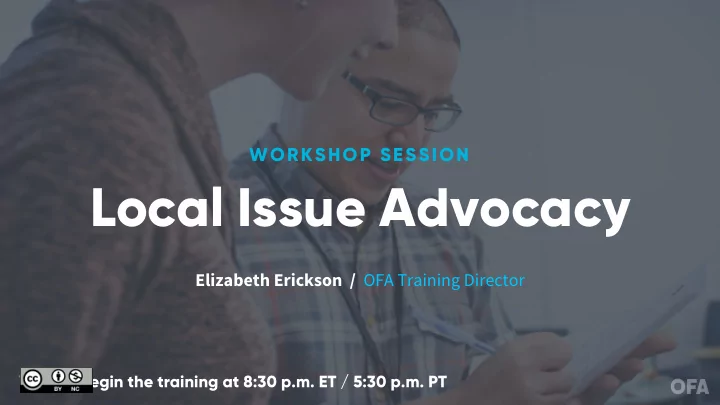

WORKSHOP SESSION Local Issue Advocacy Elizabeth Erickson / OFA Training Director We will begin the training at 8:30 p.m. ET / 5:30 p.m. PT
“Life’s most persistent and urgent question is, “What are you doing for others?” MARTIN LUTHER KING, JR.
2 minutes Who is your example of someone who works for others selflessly? Opening How has that impacted you?
Goal for Participants will narrow from a 1 problem to an issue this session Participants will identify the best 2 practices of an issue statement Participants feel a sense of 3 community with the group, particularly with the members that are working on a similar issue
Guided worksheet BIT.LY HERE
Tonight’s Opening agenda Organizer continuum Review of indicators of good issues Group norms for workshops Group protocol Closing
#OFAction
Our learning Introductions; advocacy overview Week 1: journey Week 2: Workshop Foundations of coalition building Week 3: Workshop Week 4: Identifying legislation Week 5:
Our learning Workshop Week 6: journey Writing your campaign plan Week 7: Workshop Week 8: Running into barriers Week 9: Closing synthesis and next steps Week 10:
Tonight’s Opening agenda Organizer continuum Review of indicators of good issues Group norms for workshops Group protocol Closing
Organizer continuum
Organizer continuum Minimal No Changing the engagement Participation Leadership engagement system & awareness
Where do you identify yourself on the organizer continuum with your issue?
Goals
Equip individuals with the skills to identify root problems in their 1 community, and propose a campaign plan addressing these root problems. To identify all the components of successful coalitions, and apply these 2 elements of building a coalition in their community To explain current legislation surrounding their issue, and take appropriate 3 action To analyze the barriers and challenges that we face as we implement our 4 campaign plans, and persevere strategically The develop a community of learners that support, push, challenge, and 5 celebrate each other
Success
Tonight’s Opening agenda Organizer continuum Review of indicators of good issues Group norms for workshops Group protocol Closing
Indicators of • Result in the improvement of people’s lives good issues…. • Make people aware of their own power • Be winnable • Be widely felt • Be deeply felt • Be easy to understand • Have a clear decision maker • Have a clear time frame • Be consistent with your values and vision
Problems = Broad areas of concern Examples: unaffordable health care, pollution, unemployment
Issues = Solution or partial solution to a problem Examples: enacting a local clean energy plan
WE MUST KNOW THESE ANSWERS DEEPLY. Question Rating Who is affected by the issue? What are the consequences of the issue? What is the economic impact of the issue? What are the barriers? What are the resources? What is the history of the issue in your community?
Rate yourself
Tonight’s Opening agenda Organizer continuum Review of indicators of good issues Group norms for workshops Group protocol Closing
Group norms
Norm 1: Develop an ethic of sharing.
Norm 2: It’s okay to question. Asking for why; asking for evidence; receive feedback in kind.
Norm 3: No one is above critique, no one is below dignity.
Additions?
Tonight’s Opening agenda Organizer continuum Review of indicators of good issues Group norms for workshops Group protocol Closing
• Groups of three 15 minutes Group Protocol • Decide who is person A, B, C • Person A: You share the context of the problem you are working on, the issue, your timeline, and why you care about it • People B & C: Be ready to share 3 affirmations, 2 questions, 1 underlying assumption
3 minutes Person A: Reflection Share: • Context of the problem you are working on • Your issue statement • Timeline of how long you have been working on it • Why you care about this issue
2 minutes Person B & C: Reflection Share: • 3 affirmations • 2 questions • 1 underlying assumption
3 minutes Person B: Reflection Share: • Context of the problem you are working on • Your issue statement • Timeline of how long you have been working on it • Why you care about this issue
2 minutes Person A & C: Reflection Share: • 3 affirmations • 2 questions • 1 underlying assumption
3 minutes Person C: Reflection Share: • Context of the problem you are working on • Your issue statement • Timeline of how long you have been working on it • Why you care about this issue
2 minutes Person A & B: Reflection Share: • 3 affirmations • 2 questions • 1 underlying assumption
Group share
Tonight’s Opening agenda Organizer continuum Review of indicators of good issues Group norms for workshops Group protocol Closing
Debrief What did I learn today? What am I leaving committing to now go, do, understand?
Homework
Next session
Thank you for joining today’s webinar. Please fill out the survey below and give us your feedback on today’s training. bit.ly/AdvocacyBeliefs
Recommend
More recommend